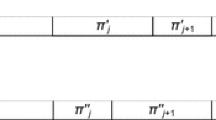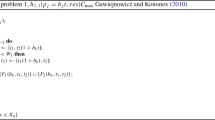Abstract
This paper represents a first attempt at a systematic study of sensitivity analysis for scheduling problems. Because schedules contain both combinatorial and temporal structures, scheduling problems present unique issues for sensitivity analysis. Some of the issues that we discuss have not been considered before. Others, while studied before, have not been explored in the context of scheduling. The applicability of these issues is illustrated using well-known scheduling models. We provide fast methods to determine when a previously optimal schedule remains optimal. Other methods restore an optimal schedule after a parameter change. The value of studying the sensitivity of an optimal sequence instead of the sensitivity of an optimal schedule is demonstrated. We show that, for some problems, sensitivity analysis results depend on the positions of jobs with changed parameters. We identify scheduling problems where performing additional or different computations during optimization facilitates sensitivity analysis. To improve the robustness of an optimal schedule, selection among multiple optimal schedules is considered. We discuss which types of sensitivity analysis questions are intractable because the scheduling problem itself is intractable. We also study how heuristic error bounds vary when the data of a scheduling problem is continuously modified. Although we focus on scheduling problems, several of the issues we discuss and our classification scheme can be extended to other optimization problems.
Similar content being viewed by others
REFERENCES
Ahuja, R. K., T. L. Magnanti, and J. B. Orlin, Network Flows: Theory, Algorithms and Applications. Prentice Hall, Englewood Cliffs, NJ, 1993.
Anderson, D. R., D. J. Sweeney, and T. A. Williams, Contemporary Management Science With Spreadsheets. South-Western College Publishing, Cincinnati, OH, 1999.
Ball, M. O. and R. Taverna, “Sensitivity analysis for the matching problem and its use in solving matching problems with a single side constraint,” Ann. Oper. Res., 4, 25–56 (1985).
Bazaraa, M. S., J. J. Jarvis, and H. D. Sherali, Linear Programming and Network Flows, 2nd edition. John Wiley, New York, NY, 1990.
Bradley, S. P., A. C. Hax, and T. L. Magnanti, Applied Mathematical Programming. Addison-Wesley, Reading, MA, 1977.
Bruno, J. L., E. G. Coffman, Jr, and R. Sethi, “Scheduling independent tasks to reduce mean finishing time,” Commun. ACM, 17, 382–387 (1974).
Camm, J. D. and T. H. Burwell, “Sensitivity analysis in linear programming models with common inputs,” Decision Sci., 22, 512–518 (1991).
Chakravarti, N. and A. P. M. Wagelmans, “Calculation of Stability Radii for Combinatorial Optimization Problems,” Oper. Res. Lett., 23, 1–7 (1998).
Conway, R. W., W. L. Maxwell, and L. W. Miller, Theory of Scheduling. Addison-Wesley, Reading, MA, 1967.
Cook, W., A. M. H. Gerards, A. Schrijver, and E. Tardos, “Sensitivity theorems in integer linear programming,” Math. Program., 34, 251–264 (1986).
Cozzens, M. and F. S. Roberts, “Greedy algorithms for T-colorings of graphs and the meaningfulness of conclusions about them,” J. Combin. Inform. Systems Sci., 16, 286–299 (1991).
Daniels, R. L. and P. Kouvelis, “Robust scheduling to hedge against processing time uncertainty in single-stage production,” Manage. Sci., 41, 363–376 (1995).
Dawande, M. W. and J. N. Hooker, “Inference-based sensitivity analysis for mixed integer programming,” Oper. Res., 48, 623–634 (2000).
Derigs, U., “Postoptimal analysis for matching problems,” Method Oper. Res., 49, 215–221 (1985).
Derigs, U., Programming in Networks and Graphs. Springer, New York, 1988.
Federgruen, A. and M. Tzur, “Minimal forecast horizons and a new planning procedure for the general dynamic lot sizing model: nervousness revisited,” Oper. Res., 42, 456–468 (1994).
Gabow, H. N. and R. E. Tarjan, “Faster scaling algorithms for network problems,” SIAM J Comput., 18, 1013–1036 (1989).
Gal, T., Postoptimal Analyses, Parametric Programming and Related Topics. McGraw-Hill, Great Britain, 1979.
Garey, M. R. and D. S. Johnson, Computers and Intractability: A Guide to the Theory of NP-Completeness. Freeman, San Francisco, 1979.
Geoffrion, A. M. and R. Nauss, “Parametric and postoptimality analysis in integer linear programming,” Manage. Sci., 23, 453–466 (1977).
Graham, R. L., “Bounds on the performance of scheduling algorithms,” in E. G. Coffman, Jr. (ed.), Computer and Job-Shop Scheduling Theory, John Wiley, New York, 1975.
Graham, R. L., E. L. Lawler, J. K. Lenstra, and A. H. G. Rinnooy Kan, “Optimization and approximation in deterministic machine scheduling: A survey,” Ann. Discrete Math., 5, 287–326 (1979).
Greenberg, H. J., “An annotated bibliography for post-solution analysis in mixed integer programming and combinatorial optimization,” in D. L. Woodruff (ed.), Kluwer Academic Publishers, Dordrecht, The Netherlands, pp. 97–148, 1998.
Gusfield, D., Sensitivity Analysis for Combinatorial Optimization. Ph.D. Thesis. UCN/ERL M80/22, Research Memorandum, Electronics Research Laboratory, Berkeley, CA, (1980).
Hall, N. G., “Single and multiple processor models for minimizing completion time variance,” Nav. Res. Logist. Q., 33, 49–54 (1986).
He, Y., H. Kellerer and V. Kotov, “Linear compound algorithms for the partitioning problem,” Nav. Res. Logist., 47, 593–601 (2000).
Hillier, F. S. and G. J. Lieberman, Introduction to Operations Research. 6th edition. McGraw-Hill, New York, 1995.
Jackson, J. R., Scheduling a Production Line to Minimize Maximum Tardiness. Research Report 43, Management Science Research Project, University of California, Los Angeles, 1955.
James, R. J. W. and J. T. Buchanan, “Robustness of single machine scheduling problems to earliness and tardiness penalty errors,” Ann. Oper. Res., 76, 219–232 (1998).
Kanet, J. J., “Minimizing the average deviation of job completion times about a common due date,” Nav. Res. Logist. Q., 28, 643–651 (1981).
Karp, R. M., “Reducibility among combinatorial problems,” in R. E. Miller and J. W. Thatcher (eds), Complexity of Computer Computations, Plenum Press, New York, pp. 85–103, 1972.
Karp, R. M. and J. B. Orlin, “Parametric shortest path algorithms with an application to cyclic staffing,” Discrete Appl. Math., 3, 37–45 (1981).
Klein, D. and S. Holm, “Integer programming post-optimal analysis with cutting planes,” Manage. Sc., 25, 64–72 (1979).
Kolen, A. W. J., A. H. G. Rinnooy Kan, C. P. M. van Hoesel, and A. P. M. Wagelmans, Sensitivity analysis of list scheduling heuristics Discrete Appl. Math., 55, 145–162 (1994).
Kouvelis, P., R. L. Daniels, and G. Vairaktarakis, “Robust Scheduling of a Two-Machine Flow Shop with Uncertain Processing Times,” IIE Transactions, 32, 421–432 (2000).
Kouvelis, P., and G. Yu, Robust Discrete Optimization and its Application. Kluwer Academic Publishers, Dordrecht, 1996.
Kravchenko, S. A., Y. N. Sotskov, and F. Werner, “Optimal schedules with infinitely large stability radius,” Optimization, 33, 271–280 (1995).
Kuhn, H. W., “The Hungarian method for the assignment problem,” Nav. Res. Logist. Q., 2, 83–97 (1955).
Lawler, E. L., “Sequencing jobs to minimize total weighted completion time subject to precedence constraints,” Ann. Discrete Math., 2, 75–90 (1978).
Lawler, E. L. and J. M. Moore, “A functional equation and its application to resource allocation and sequencing problems,” Manage. Sci., 16, 77–84 (1969).
Mahadev, N. V. R., A. Pekeč, and F. S. Roberts, “On the meaningfulness of optimal solutions to scheduling problems: can an optimal solution be nonoptimal?”, Oper. Res., 46, S120-S134 (1998).
Marsten, R. E. and T. L. Morin, “Parametric integer programming: The right hand side case,” in P. Hammer et al. (eds), Annals of Discrete Mathematics: Studies in Integer Programming, Elsevier, North Holland, 1977.
McNaughton, R., “Scheduling with deadlines and loss functions,” Manage. Sci., 6, 1–12 (1959).
Moore, J. M., “An n job, one machine sequencing algorithm for minimizing the number of late jobs,” Manage. Sci., 15, 102–109 (1968).
Papadimitriou, C. H. and K. Steiglitz, Combinatorial Optimization: Algorithms and Complexity. Prentice-Hall, Englewood Cliffs, NJ, 1982.
Piper, C. J. and A. A. Zoltners, “Some easy postoptimality analysis for zero-one programming,” Manage. Sci., 22, 759–765 (1976).
Rinnooy Kan, A. H. G., Machine Scheduling Problems: Classification, Complexity and Computations. Nijhoff, The Hague, The Netherlands, 1976.
Roberts, F. S., “Meaningfulness of conclusions from combinatorial optimization,” Discrete Appl. Math., 29, 221–241 (1990).
Roodman, G. M., “Postoptimality analysis in zero-one programming by implicit enumeration,” Nav. Res. Logist. Q., 19, 435–447 (1972).
Schrage, L. E., “A proof of the optimality of the shortest remaining processing time discipline,” Oper. Res., 16, 687–690 (1968).
Schrage, L. E. and L. A. Wolsey, “Sensitivity analysis for branch and bound integer programming,” Oper. Res., 33, 1008–1023 (1985).
Seeger, A., “Subgradients of optimal-value functions in dynamic programming: The case of convex systems without optimal paths,” Mathematics Oper. Res., 21, 555–575 (1996).
Smith, W. E., “Various optimizers for single stage production,” Nav. Res. Logist. Q., 3, 59–66 (1956).
Sotskov, Y. N., “Stability of an optimal schedule,” Eur. J. Oper. Res., 55, 91–102 (1991).
Sotskov, Y. N., V. K. Leontev, and E. N. Gordeev, “Some concepts of stability analysis in combinatorial optimization,” Discrete Appl. Math., 58, 169–190 (1995).
Sotskov, Y. N., A. P. M. Wagelmans, and F. Werner, “On the calculation of the stability radius of an optimal or an approximate schedule,” Ann. Oper. Res., 83, 213–252 (1998).
Steele, D. C., “The nervous MRP system: How to do battle,” Prod. Invent. Manage., 16, 83–89 (1973).
Tovey, C. A., “Rescheduling to minimize makespan on a changing number of identical processors,” Nav. Res. Logist. Q., 33, 717–724 (1986).
Tovey, C. A., “A simplified anomaly and reduction for precedence constrained multiprocessor scheduling,” SIAM J. Discrete Math., 3, 582–584 (1990).
Van Hoesel, C. P. M., and A. Wagelmans, “On the complexity of postoptimality analysis of 0/1 programs,” Discrete Appl. Math., 91, 251–263 (1999).
Wagelmans, A. P. M., Sensitivity Analysis in Combinatorial Optimization. PhD Thesis, Erasmus University, Rotterdam, Netherlands, 1990.
Wagner, H. M., “Global sensitivity analysis,” Oper. Res., 43, 948–969 (1995).
Weber, G. M., “Sensitivity analysis of optimal matchings,” Networks, 11, 41–56 (1981).
Wendell, R. E., “Tolerance approach to sensitivity analysis in linear programming,” Manage. Sci., 31, 564–578 (1985).
Wendell, R. E., “Sensitivity analysis revisited and extended,” Decision Sci., 23, 1127–1142 (1992).
Wondolowski, F. R. Jr, “A generalization of Wendell's tolerance approach to sensitivity analysis in linear programming,” Decision Sci., 22, 792–810 (1991).
Wolsey, L. A., “Integer programming duality: Price functions and sensitivity analysis,” Math. Program., 20, 173–195 (1981).
Author information
Authors and Affiliations
Corresponding author
Rights and permissions
About this article
Cite this article
Hall, N.G., Posner, M.E. Sensitivity Analysis for Scheduling Problems. Journal of Scheduling 7, 49–83 (2004). https://doi.org/10.1023/B:JOSH.0000013055.31639.f6
Issue Date:
DOI: https://doi.org/10.1023/B:JOSH.0000013055.31639.f6




